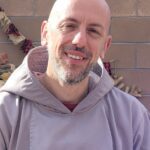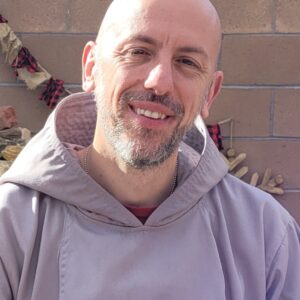The essence of Christian discipleship can be summed up in the words of Jesus: “If any man would come after me, let him deny himself and take up his cross and follow me” (Mt 16:24). These words can be easily misinterpreted as something that is negative, out of touch with reality, and even harmful to us physically and psychologically. The reason for such a dark view of Christianity is because they assume that when Jesus tells us to “deny ourselves” that we must deny our very being, and therefore forfeit the gift of life that God has given us. This can lead people to view Christianity as lifeless, joyless, and devoid of any human sentiments and experiences. Considering then the grave misunderstanding that can occur regarding Christianity, it is worth pondering for a moment who or what is this self that I must deny? Do I really have to deny my very own being and my own life? If so, why?
In the areas of both spirituality and psychology, there is quite a bit of literature about a “true self and a false self.” Essentially, our true self is the self who has been made in the image and likeness of God (Genesis 1:26). Because original sin has greatly affected every aspect of the human person, we can find it difficult to not only experience but believe that we are indeed made in the image and likeness of God. Even though sin, both original sin and our own personal sin, has greatly distorted our human perception and understanding, in Christ and specifically through Baptism, our relationship with God has been restored. Through the healing waters of Baptism our true self comes back into focus and thus enables us to perceive and understand once again who we truly are. St. Paul writes, “We were buried therefore with him by baptism into death, so that as Christ was raised from the dead by the glory of the Father, we too might walk in newness of life” (Romans 6:4). Hence, through Jesus Christ those of us who have been baptized have become a “new creation” (2 Corinthians 5:17), and enjoy, through no merit of our own, the status of a beloved son or daughter of God. As a beloved son or daughter of God, St. Paul reminds us that our true life, and therefore our true self, “is hidden with Christ in God” (Colossians 3:3).
It would be impossible to underestimate how revolutionary this way of thinking is and how contrary it is to the way of the world. For a Christian, one’s true self, their ultimate identity, has nothing to with one’s career, social status, ethnicity, or the many other external things the world often associates to be part of one’s identity, i.e., their true self. Nor do we become our true self after building up a resume of accomplishments, whether they be worldly or spiritual, or by seeking through the things of this world and gaining people’s affirmation and attention. Rather, we become our true self simply by receiving it from God. Our true self then is the free gift of God’s life and love to us, and we act out our true self when we are living as His children and when that is enough for us.
We become our true self simply by receiving it from God. Our true self then is the free gift of God’s life and love to us, and we act out our true self when we are living as His children and when that is enough for us.
Our “false self” therefore, is someone entirely different. It is someone for whom being a child of God is not enough. Rather, the false self is that self within us that wants to be his own person, follow his own ideas and plans, make his own decisions, and create himself and his life according to his own vision. Hence, the false-self desires to live a life separate from God, and for all practical purposes the false self is choosing to be someone else other than who they really are.
If the false self is someone who wants to exist outside of reality and outside of God’s will, one may sincerely ask, who would really want to do that? The answer is, we all do to some extent! By simply looking at our daily life and examining some of our motives, actions, and words, we cannot help but to admit that this is true. Sometimes we are conscious of this and sometimes we are not. Sometimes we deliberately plan to do so while other times it seems to happen almost naturally. Regardless, there is inside each one of us various motives, actions, and words, that not only want to create this false self, but to live from it.
Throughout the course of my priesthood, many people have asked me what I think the most important thing is that they can do in their spiritual life to grow in holiness. The obvious answer to this question is to live a sacramental life in a state of grace. However, as necessary as the sacraments and grace are to our relationship with God, simply receiving the sacraments is not a guarantee that one is growing in holiness. Because of this reality of the false self, the temptation towards illusion is prevalent inside each one of us. Therefore, the most fundamental and necessary work of the spiritual life is to spend time with God, or as Jesus says, “Abide in me,” since “apart from me you can do nothing” (John 15:4-5). We can spend time with God by meditating on His word, immersing ourselves in the liturgy of the Church, spending time each day listening to God and speaking to him in personal prayer, and trying as best we can to put his words and teachings into practice in our daily lives in the context of our own individual vocations.
When we are abiding in God our true self awakens from the slumber that our false self creates and we become, over time, less inclined to be anyone other than who we really are in God. The reason for this is simple: the deeper our relationship with God, the more we encounter His utter goodness, love, and mercy and the less tempted we are to desire a life separate from Him. If we are not spending time each day with God the power and grace of the sacraments will be limited and have a minimal effect on us, not because there is something wrong with the sacraments, but because there is something wrong with us. What is wrong with us? We are not immersing ourselves in God and His life, therefore we almost naturally slip into living for and fulfilling the desires and dreams of our false self, since that is who we know most deeply.
I once heard a priest friend of mine tell his congregation, “The difference between a saint and a sinner is simple. A saint knows exactly who they are and who they are not, whereas a sinner has no idea who they are because they believe they are someone who they are not.” To put it more simply, a saint knows that their true self can only be found in God. Therefore, they don’t waste time looking for their identity among the things of this world. The sinner, unfortunately, believes that their true self is somewhere out there, among the passing things of this world, and they spend a great deal of time, sometimes an entire life, looking for their true self where it cannot be found.
When we understand the complexities of our human nature, it is very clear that Jesus’ words about “denying ourselves” are not negative at all but are in fact very positive and even healthy. Nor are they out of touch from reality, but in fact root us more deeply in reality because Jesus is attempting to spare us from the misery that follows from trying to live a life apart from Him and from trying to have a “self” separate from God. In other words, He is reminding us that if we truly want to follow him, we must deny and even throw away this false self with this false life that it creates, and turn our entire self to Him, who is truth and life so we can discover who we truly are, but also who God really is.
If we truly want to follow him, we must deny and even throw away this false self with this false life that it creates, and turn our entire self to Him, who is truth and life so we can discover who we truly are, but also who God really is.
People throughout history have attempted to create and live from this false self. When someone does this, the result is always the same: a temporary happiness or a fleeting experience of fulfillment at best, yet when “the rain fell, and the floods came, and the winds blew and beat against that house…great was the fall of it” (Matthew 7:27). The false self cannot withstand the many temptations, trials, and sufferings we face in this life simply because it has no foundation to stand on. Since the false self is built upon an illusion and a lie, its life expectancy is very short. Our true self however, who we really are in God, is the only solid foundation that can withstand anything and everything we may experience in this world, because our true self is rooted in God, a foundation that cannot be destroyed, and whose life expectancy has no end.
________________________________________________________________________
Image courtesy of Unsplash




